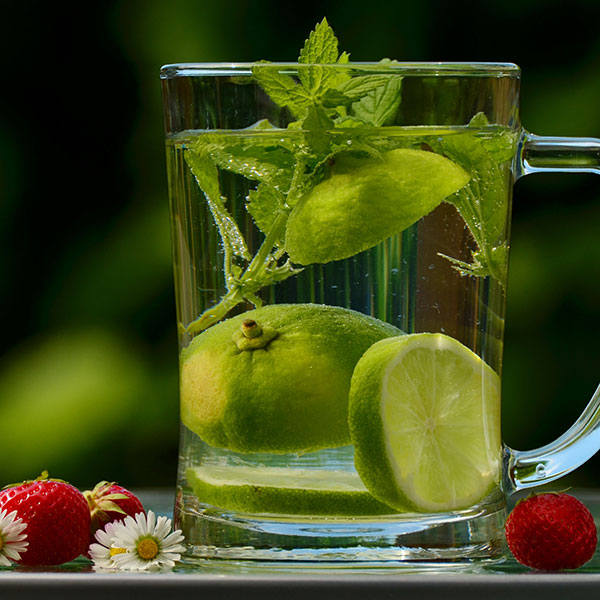
We do need to stay hydrated as our bodies are 60% water and we can not survive without water for more than 2 or 3 days while we could manage without food for weeks.
An adequate level of fluids allows our body to transport nutrients into cells to produce energy, eliminate toxins through urine, relieve constipation, maintain beautiful skin, reduce urinary tract infections and avoid cramps after exercise.
What should we drink? Forget about juices, sports drinks and fizzy drinks, water is best!
To keep yourself well hydrated without adding calories to our diet or toxins drink plenty of water and herbal teas.
Water hydrates us in the purest way because it contains no sugar and no harmful chemicals such as sweeteners, saccharin or caffeine. The key question now is what type of water is the healthiest?
Tap water is widely available and cheap, but may contain certain metals and toxins such as lead, aluminum and industrial chemicals that could have a negative impact on health.
If you do not like the taste of tap water you can add a few lemon or orange slices or some cucumber ribbons. I quite like adding some mint leaves and a little ginger to mine. A fun way to cool your water and add a little colour to your table is to make ice cubes with a strawberry or raspberry inside.
Bottled water is convenient but plastic bottles contain Bisphenol A (BPA), a chemical that has been linked to hormonal imbalances and diseases such as breast cancer. In restaurants, whenever possible, order bottled water glass.
Filtered water which has gone through a good quality filter that eliminates most heavy metals and chemicals is my preferred option. If you need a water bottle at the gym or on the way to work, invest in one that does not contain BPA and you can fill with filtered water at home. Wash it thoroughly after each use to prevent accumulation of bacteria.
Other drinks
Bottled juices, flavoured water and carbonated beverages contain high levels of sugar, caffeine, preservatives and typically no natural nutritients.
Excessive alcohol drinking dehydrates us more than we think, so my advice is: drink alcohol in moderation, do not drink every day, have a glass of water between drinks and always choose the best possible quality of wine, beer or spirits. Also, alcohol consumption promotes weight gain and interacts with hormonal balance so it is advisable not to mix it with sweetened beverages which may enhance these effects.
Coffee and tea are diuretic drinks so I recommend consuming them in moderation, without sugar or sweeteners and avoid them on an empty stomach which would lead to a more market energy rise and subsequent drop.
Tea, especially green tea, and organic coffee contain antioxidants so if you enjoy a coffee after a meal or have an afternoon snack with a cup of green tea, enjoy them but in moderation.
Herbal teas are a great choice to stay hydrated in the cooler months or for those who do not like plain water but remember to avoid adding sugar or sweeteners!
Foods such as soups, salads, fruits and vegetables have a high water content and also help us hydrate.
How much should you drink? Listen to your body!
The answer is not straight forward because the need of hydration depends on the amount of fluid that is lost through urine, perspiration and breathing. Each person needs a different amount of fluid depending on their level of exercise, their job and work environment and the temperature and humidity of your environment.
There is no research that stating conclusively that we should drink two litres of water a day. Your body will tell you if we are not drinking enough through symptoms of dehydration such as headaches, poor concentration, fatigue, constipation and obviously thirst and only passing small amounts of urine. Urine when we are not drinking enough tends to be a darker shade of yellow – the colour that indicates optimal hydration is pale yellow, the colour of straw.
In warmer climates more moisture is needed to compensate for fluid loss through sweat.
Likewise, intense exercise causes loss of fluids in our body, which should also be considered.
During pregnancy we need more water in our body due to increased blood volume, amniotic fluid, etc. During lactation even more fluids are necessary to produce milk, so it is advisable to consume a glass of water during each feed.
If you suffer from vomiting or diarrhoea, it is advisable to increment the amount of fluids you are consuming to avoid dehydration but make sure you drink little and often.
When should you drink?
At night we become dehydrated so it is a god idea to drink a glass of water right after waking up. Now that winter is coming, why not try a mug of hot water with a squeeze of lemon? This helps to maintain an alkaline pH, which in turn helps eliminate toxins.
I recommend drinking little and often during the day rather than having large drinks once or twice, and of course, respond to thirst!
Lastly, staying hydrated can help maintain your ideal weight because sometimes we we are hungry but actually what we need in a glass of water.